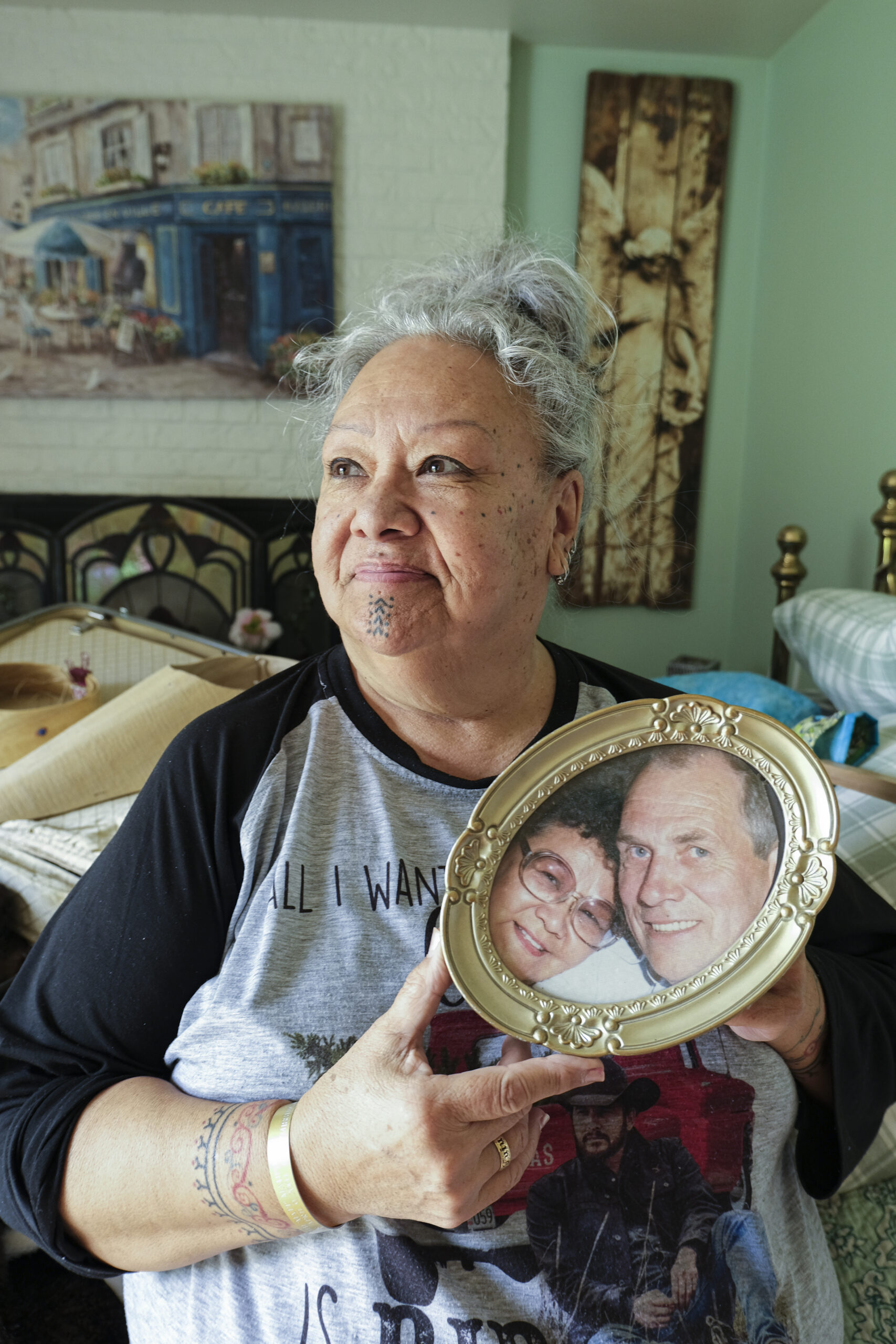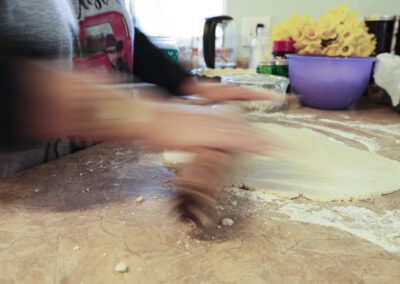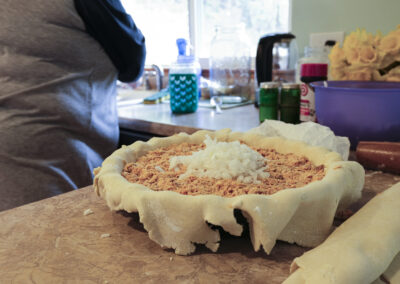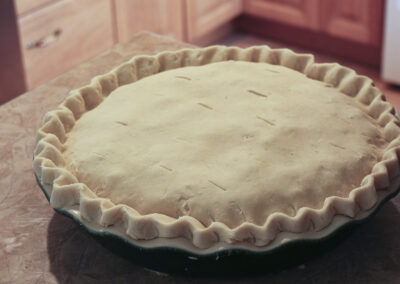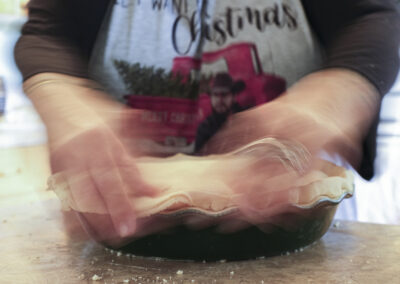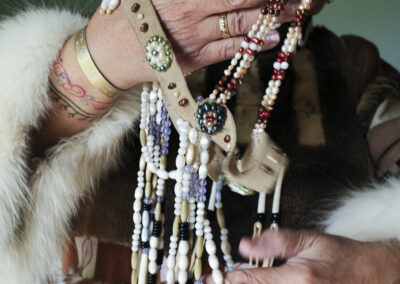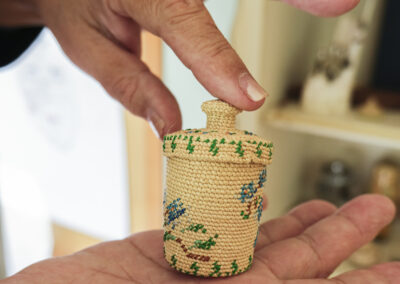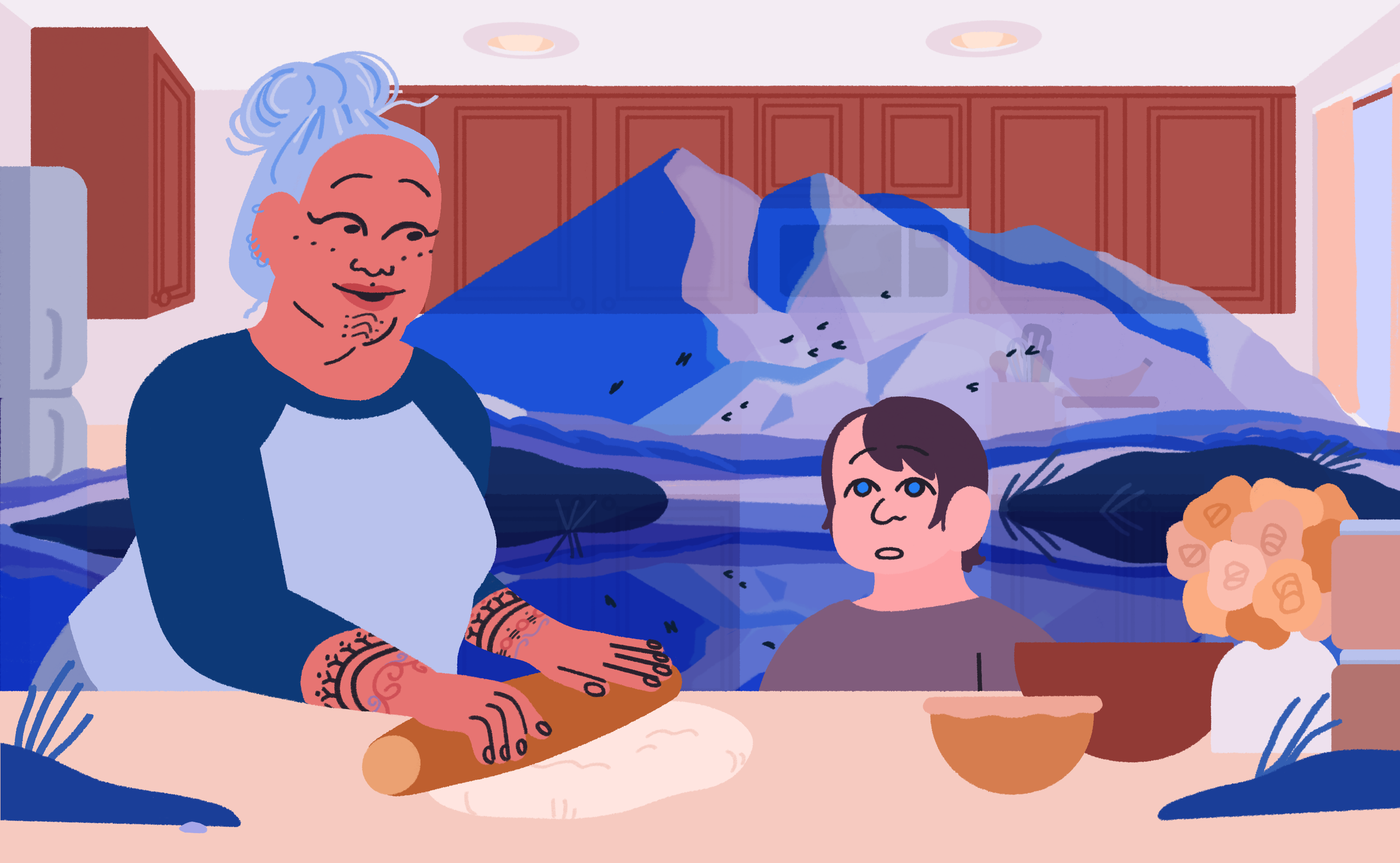
SHIDEH GHANDEHARIZADEH / NEXTGENRADIO
home?
Kanesia McGlashan-Price speaks to tribal elder Becky Bendixen about her Unangax̂ heritage. Although she left her ancestral homelands in the Aleutian Chain for a new life in Bellingham, Washington, Becky finds strength in sharing Unangax̂ stories and traditions with her grandchildren. Through cooking traditional foods like fish pie and teaching Unangax̂ song and dance, she’s creating spaces that feel like home away from home.
Fish pie and seal skins bridge elder’s ties to Unangax̂ homeland
LISTEN TO THE AUDIO STORY
Click here for audio transcript
[REPORTER]
Hi, my name is Kanesia McGlashan Price with NextGen Radio Indigenous in Bellingham, Washington.
Becky Bendixen is a spirited Unangax elder who is proud of her ancestry.
She finds strength in sharing stories and traditions with her grandchildren….
… and reclaiming her culture that her own parents were not allowed to practice.
[BECKY] Home feels like the way of life that my ancestors lived. Home feels like when I gather my family together and we eat our traditional foods.
I rolled out a regular pie crust. And this is going to be Pirog or Pirugax̂. And now I’m adding a layer of rice and a little bit of seasoning salt, and then we do a layer of chopped onions, spread that out evenly. Then there’s the star of our show – salmon.
You can use salt salmon that you have soaked out, or you can use fresh salmon and just put a whole slab across. A lot of people do that. But this one is going to be just very plain, very basic. That’s how my grandkids like it. So this is for them.
In Unangam Tunuu Nordaliinada asaqtakuqing, Unangax̂ akuqing.
So in English, my name is Becky Bendixon. I’m from King Cove, Alaska and I lived up there for 41 years before moving to Washington State.
I made a pact with myself that I was going to bring Unangax̂ culture down here to Washington. My friend helped me form a 501c3 and we call it Northwest Unangax̂ Culture.
The beads that are hanging down, these represent the women’s hair because Unangax̂ women had hair usually down to their knees, a lot of long, beautiful hair.
At the very top of the head dress, we have a circle form. And this circle is the portal that we traveled to and from to our ancestors as we dance, because we believe that when you are dancing, you’re bringing your ancestors back.
And that’s why I have all the tattoos on my wrists and ankles. Because we believe these are protection for them and for me. So if I have an ancestor with a bad feeling coming in, the feeling wouldn’t be able to enter me.
But if I come to the dance floor with the ugly feeling in me, it can’t get out either. So it protects my ancestors. It’s a portal to our ancestors.
Home feels like when I’m teaching my culture, either to students, but more so to my grandchildren. When I teach them our songs and our language, that’s what home feels like.
We didn’t practice our Unangax̂ culture in King Cove very much at all. We did the traditional foods and the hunting and everything, but as far as the dancing and speaking, my mother was beaten for speaking Unangam Tunuu. She spoke that until she was six.
So my mom and her sisters, they all lived really close. And they would always speak their language, but they never taught any of us kids. Because they were taught to be ashamed of their language. They [were] taught that they were less than because they spoke that language.
The fact that I can speak my language, the language that my ancestors were beaten for speaking is incredible.
It’s so empowering.
It’s like, “We won! We won, this is our language and you’re not taking it from us.” It’s empowering. It’s invigorating.
It connects me to home all the time.
Flour-covered hands knead and fold dough on a kitchen counter in Bellingham, Washington. This is the start of what will be a savory fish pie.
Becky Nordaliinada Bendixen is an Unangax̂ elder from King Cove, Alaska – a small fishing village on the Aleutian Chain. She grew up practicing qaqamiigux̂, or subsistence, the closest English translation to the word.
“We lived by whatever food was ready to harvest,” said Bendixen.
For Unangax̂, each season of the year is accompanied by a different traditional food. Bendixen recalls salmon fishing and berry picking in the summer, followed by caribou and duck hunting in the fall. She has fond memories of learning to hunt with her father and cooking traditional foods with her mother.
Bendixen says her connection to food goes beyond the dinner table.
“The easiest way to teach about our culture is to bring out our food,” said Bendixen. “Because with our food, you bring out our traditions with the food, you bring out the language that we call the food. And always, when you get a table full of people and their traditional food, you’re gonna get stories.”
Sharing stories is what inspired Bendixen to start Northwest Unangax̂ Culture [NUC], a non-profit organization created for Unangax̂ in the Pacific Northwest to share stories through language, song, and dance.
Almost three decades ago, Bendixen moved herself and her three children to Washington State. She was going through a divorce at the time, and after weighing her options, Bendixen made the difficult decision to leave for a new and unfamiliar community.
Today, her Bellingham home is regularly filled with her seven grandchildren.
Upon relocating, she witnessed the spirited gatherings of local Washington tribes, and was inspired to bring her own culture to the region. Through NUC she established the Unangax̂ dance group Sngagim Axasniikangin [Dancers of the Dream], hosted culture camps, and spearheaded language revitalization efforts.
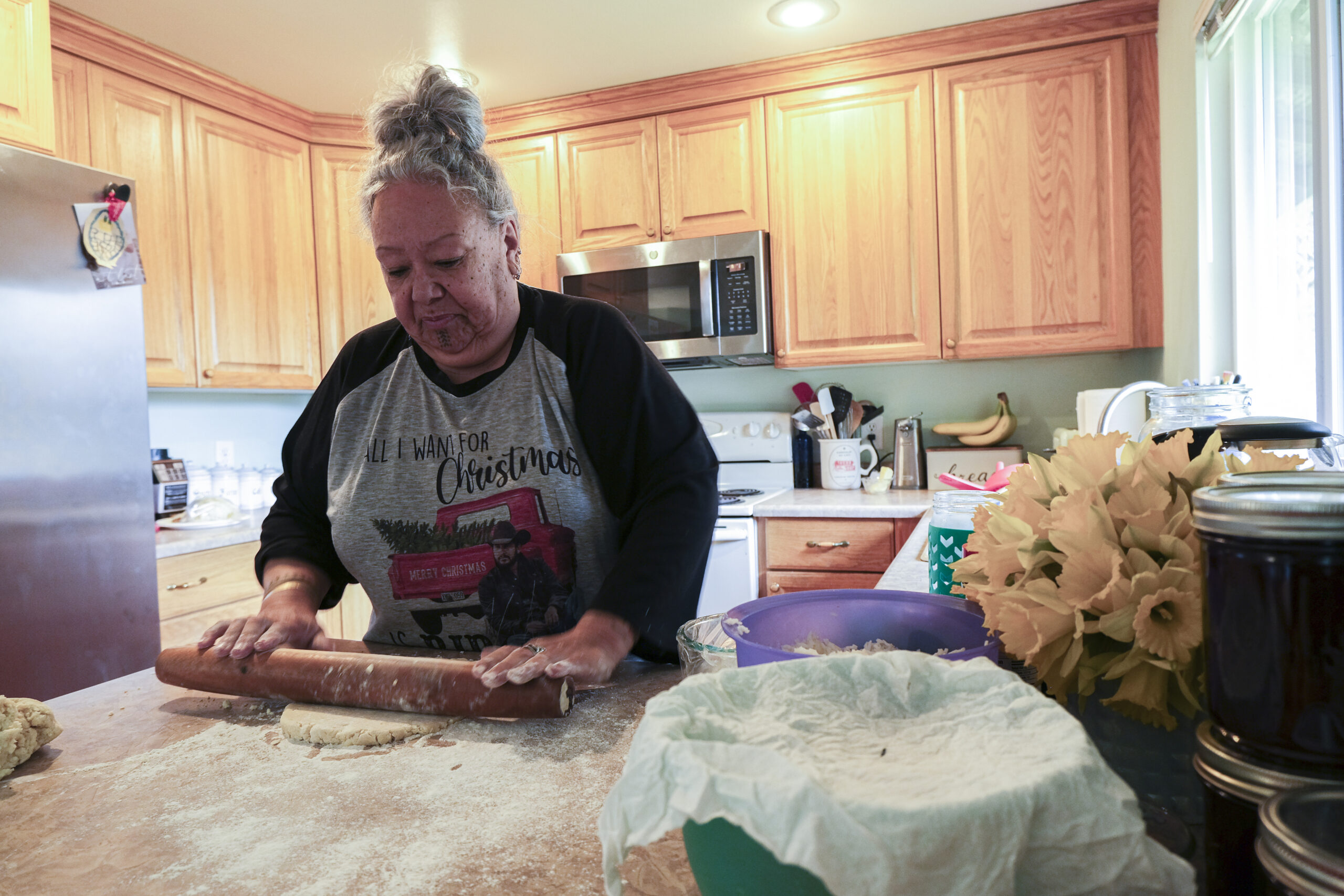
Becky Bendixen rolls out dough for a fish pie in her home on the Lummi Reservation in Washington on Monday, April 17, 2023. “The easiest way to teach about our culture is to bring out our food.”
KANESIA MCGLASHAN-PRICE / NEXTGENRADIO
Bendixen says that her favorite traditional food is anything with salmon. Here she is assembling a fish pie, a savory dish consisting of layers of rice, salmon and onions. “When you get a table full of people and their traditional food, you’re gonna get stories.”
KANESIA MCGLASHAN-PRICE / NEXTGENRADIO
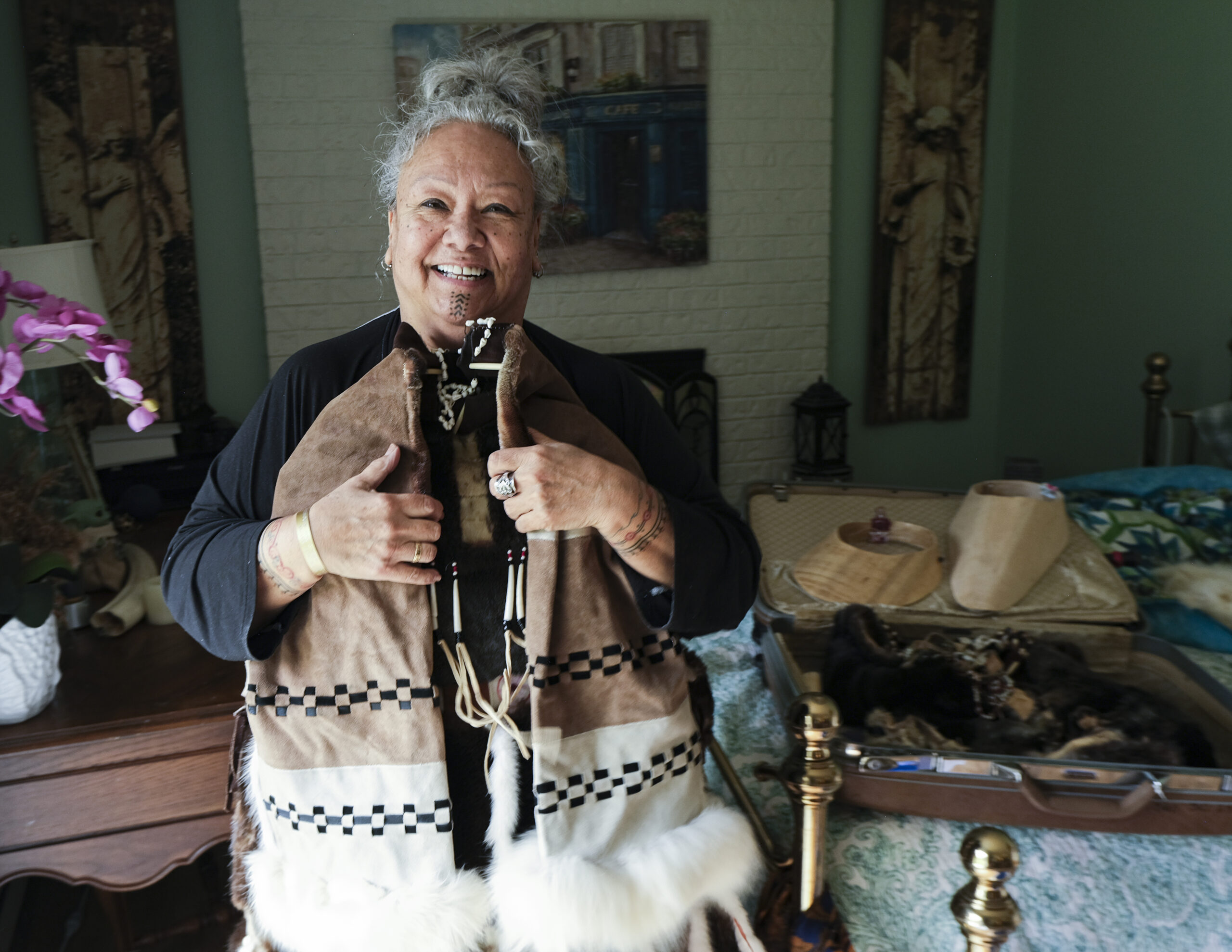
Bendixen holds up the regalia she hand-stitched from sealskin, sea otter fur and other pelts found on her ancestral lands. “Each piece of regalia shares a story of the person who’s wearing it.”
KANESIA MCGLASHAN-PRICE / NEXTGENRADIO
“My grandson Axel had his own drum and he played with our dance group one time,” said Bendixen. “That was the most amazing thing because it was myself, my three children and my grandson all on stage at the same time.”
Although Bendixen grew up practicing qaqamiigux̂, Unangax̂ dance and language were not a part of her upbringing. Her mother knew how to speak Unangam Tunuu [Unangax̂ language], but it was not passed down to Bendixen.
“My mom and her sisters, they all lived really close,” said Bendixen. “And they would always speak their language, but they never taught any of us kids. They were taught that they were less than because they spoke that language.”
Bendixen shares memorabilia from her homelands – an Unangax̂ headdress and grass basket from the Aleutian Chain. “The beads that are hanging down, these represent Unangax women’s hair, because Unangax̂ women had hair down to their knees.”
KANESIA MCGLASHAN-PRICE/ NEXTGENRADIO
“Because with our food, you bring out our traditions with the food, you bring out the language that we call the food. And always, when you get a table full of people and their traditional food, you’re gonna get stories.”
(Right) Bendixen shares her favorite photo of her late parents, Tessie and Edwin Bendixen. “My tattoos are extremely important to me, because they tell a story as well. The tattoos across your cheek that show your Matrilineal line, and every woman in my family would have the exact same tattoo.”
KANESIA MCGLASHAN-PRICE / NEXTGENRADIO
Bendixen’s mom was punished in elementary school for speaking Unangam Tunuu. This was a painful chapter in history for many Indigenous people at the time who were taken from their families and placed in boarding schools. She recognizes that her mom did not pass down their Unangax̂ language for protection, but Bendixen has made it her goal to help reawaken the traditions that have been asleep.
Through NUC she has been able to learn her traditional language, and has started teaching it to her grandchildren.
“The fact that I can speak my language, the language my ancestors were beaten for speaking, is incredible. It’s so empowering. It’s like, we won. This is our language and you’re not taking it from us.”
By sharing stories through language, dance, and food, Bendixen has created a home away from home. She says it’s important to teach her grandchildren about their Unangax̂ heritage because this was forcefully taken from her ancestors. Even though her children and grandchildren all live in Washington, Bendixen says they know where they come from.
“When I teach them our songs and our language, that’s what home feels like.”
